Autumn round up 2025
It's been a busy Autumn on the development front, so busy we've neglected to post a monthly update for a while now which means this update is a bit of a monster and covers the last 3 months.
Google Analytics and MediaHawk integration
In October we introduced direct integrations for Google Analytics and Mediahawk making it simple to report back on the outcome of a care enquiry to both platforms.
More accurately calculating your ROI for care enquiries using the value matrix
As part of these new integrations we've added support for defining a value matrix for your care enquiries. The value matrix allows clients to define the estimated value of a care enquiry based on multiple factors including:
- Outcome
- Type of care required
- Duration of care required (respite or permanent)
- Funding type
Once the value matrix is defined CareHQ can then provide an estimated value for a care enquiry when reporting back to external applications (such as Google Analytics or Mediahawk) ensuring an accurate value and ROI can be established for different marketing channels and referrers.
Even if you don't have any integrations in place, CareHQ can still use the care enquiry value matrix to generate an average lead value within your Sales > Acquisitions report.
Setting up your Google Analytics and/or Mediahawk integrations
If you'd like to set up your Google Analytics and/or Mediahawk integrations then please reach out to our support team, we can help you to define your care enquiry value matrix and provide guidance on finding the relevant credentials needed so that we can set up your integrations.

Auto saving and revert to draft for receipts
Reconciling large receipts, and particularly amending the reconciled items for a large receipt, can feel like a daunting task. Previously CareHQ only saved changes on reconcile which meant if you left the reconcile page or you wanted to unreconcile an existing receipt, all prior progress would be lost.
To address this CareHQ now auto-saves a draft of your reconciliation. So if you leave the page, (or power off and go home for the weekend), when you next return to the receipt you'll see your previous reconciled items and you can continue from where you left off.
And now when you unreconcile a receipt we'll create a draft reconciliation so that you don't need to add all your reconciliation lines again, you can simply adjust the items that are incorrect and save your changes.
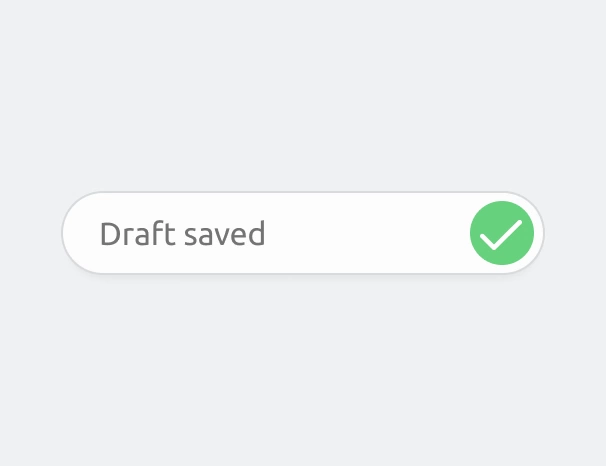
Feel confident when making adjustments with previews
Whether you're changing a contract's rate, setting a new end date or cancelling a contract entirely, you'll now see a preview of the invoices and / or credit notes. There's also a preview when you ad hoc invoice for outstanding amounts against the contract.
Previews help you feel confident about contract changes and make it simple to spot potential issues before a change is made.
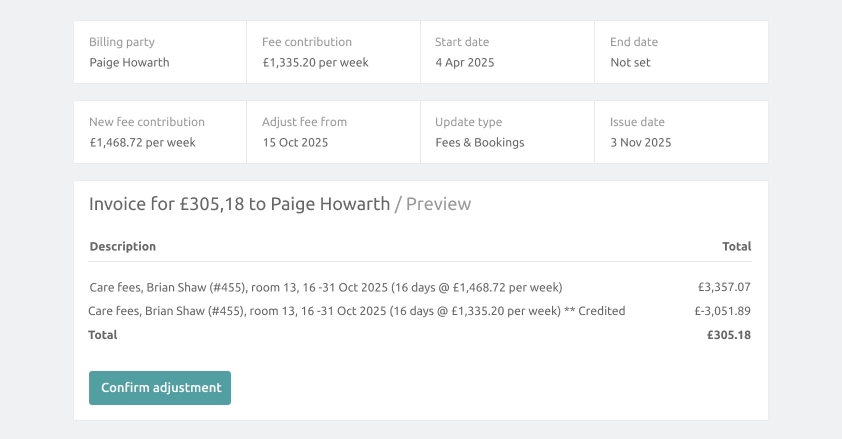
New Credit control tab
There is now a Credit control tab visible when viewing a resident record. Under credit control you'll find a list of billing parties with outstanding invoices (or credit notes) for the resident. The new tab makes it easier to quickly identify outstanding debt and the relevant billing parties for a resident.
Details of the debt position for each billing party is displayed along with the option to view the related invoices and credit control comments. Quick links are also provided to view a statement for the billing party and to add a credit control comment.
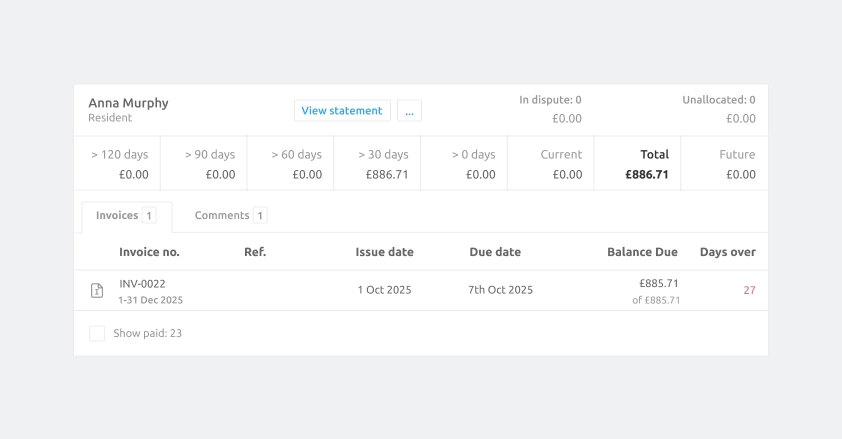
Direct debit improvements
Support for managing Direct Debit collections was introduced early in 2025. Since then we've made a number of improvements to the process based on feedback from users and we continue to update the process based on your feedback.
Avoid over billing when collecting via Direct Debit
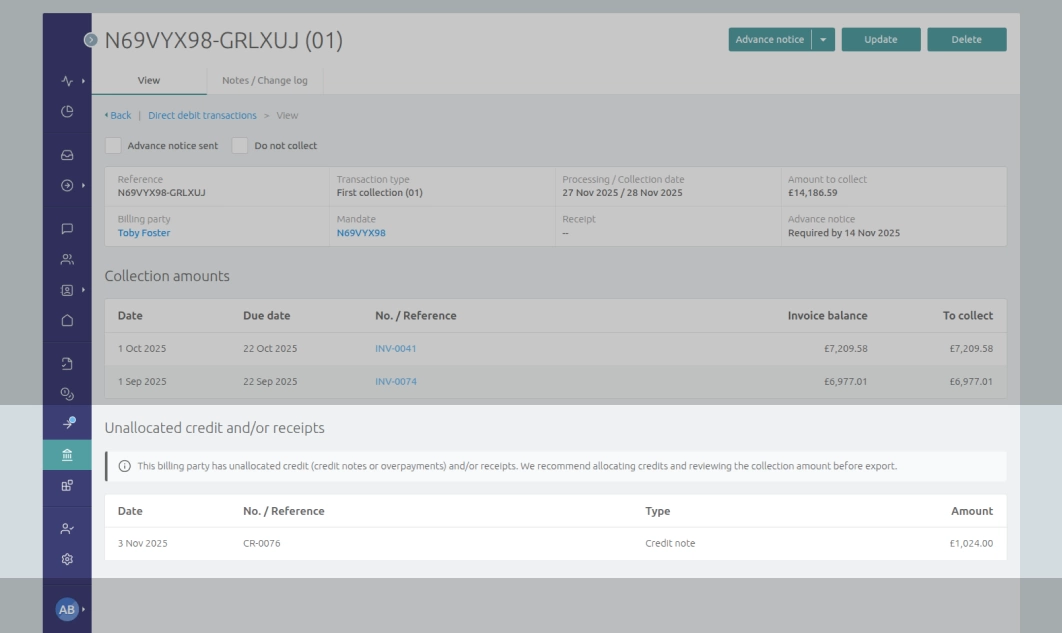
A new Discrepancies tab has been added to the Direct Debit user interface. Under the Discrepancies tab you'll find a list of Direct Debit collections due to be collected where the associated billing party has either outstanding credit notes or unallocated payment receipts.
One of the challenges with Direct Debit billing is that advance notice of a collection typically needs to be provided 10 days in advance, which means collections are generated 10 days before any money is collected and in that time frame things can change. It's not uncommon to see a credit note be issued or a payment come in at which point the outstanding Direct Debit might collect more than is due leading to an overpayment; more work for the finance team and potentially an unhappy billing payer.
To ensure this doesn't happen the Discrepancies tab lists collections that could potentially cause over billing so that users can review and address any issues up until the Direct Debit submission day (typically 2 days prior to collection).
Identify billing parties not yet paying by Direct Debit
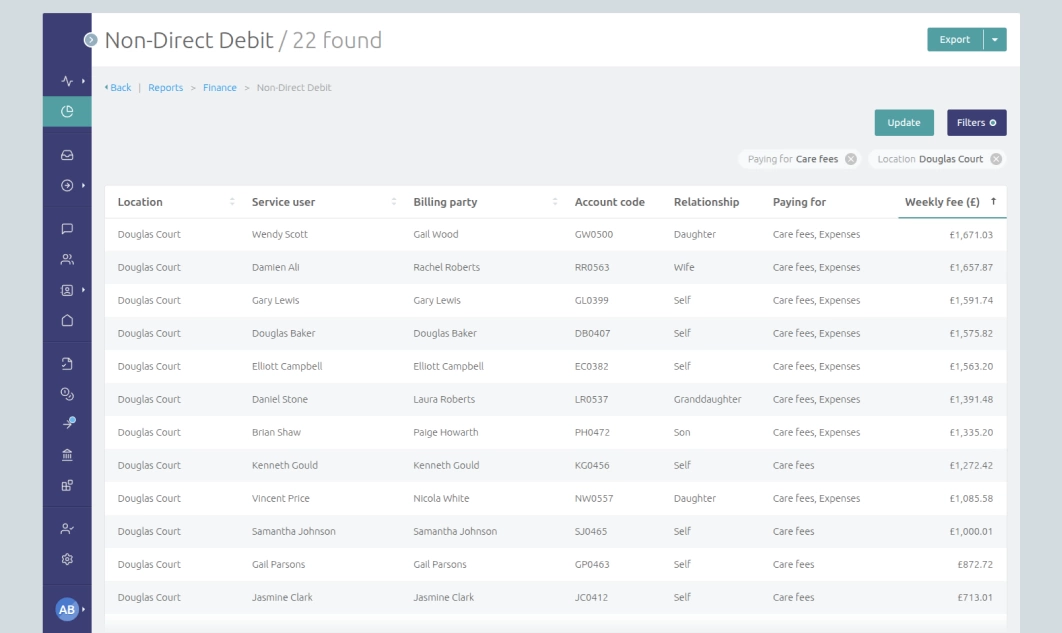
Many providers prefer to collect payments using Direct Debit as it provides:
- A cost effective payment method that typically has a fixed per collection fee (vs. a percentage which is common for card payment methods).
- A fixed payment schedule which allows for different amounts to be collected each week / month.
- A higher likelihood of successful collection compared to other payment methods.
To help care providers identify private billing parties who are not yet paying by Direct Debit we've introduced a new report which identifies private billing parties for permanent residents who are not paying via Direct Debit. The report also allows users to filter the list to those paying for care fees and those just paying for expenses so that higher value collections can be prioritised.
Invoice and Credit note merging for historic adjustments
An issue raised by a number of users this year has been the process by which historic adjustments are invoiced. In the past CareHQ has generated separate invoices and credit notes for an adjustment. For example, if you were increasing the rate someone pays from £1,000 a week to £1,200 and we're applying this change 2 weeks in the past, CareHQ might have generated the following:
- An invoice for £2,400 for the same period at the new rate
- A credit note for £2,000 for the previously billed at the old rate
This would leave a balance of £400 which is the difference in rate for 2 weeks. However, many CareHQ users provided feedback that whilst this makes sense from an accounting perspective it can be confusing to residents or a relative paying for care who just see a large new invoice and often skip/miss the amount due.
To address this concern, when CareHQ generates a credit note and invoice for the same period as part of an adjustment we now automatically merge the two leaving only an invoice or a credit note (depending on whether the adjustment is a rate increase or reduction).
So for our earlier example the result would now be a single invoice with two line items:
-
An invoice for £400
- Line item 1: £2,400 for the past 2 weeks at the new rate
- Line item 2: £-2,000 for the past 2 weeks at the previously billed rate
This change has been broadly welcomed by users, however we do provide the option to revert CareHQ to the previous process of generating separate invoices and credit notes as some care providers preferred that approach.
Other updates & fixes
- Two residents can now be booked into the same room provided the room is marked as allowing double occupancy and the two residents have been linked as partners.
- Comments can now be added to location contacts.
- Documents can now be uploaded against location contacts.
- A new knowledge base article has been published on how to fix an incorrect checkout date.
- Support for exporting invoices for Sage 200 has been added.
- It is now possible to define a list of comment groups and assign comments to those groups. Whilst optional, this feature makes it easier to organise comments into distinct groups such as credit control, contracts, etc.
- Receipt reconciliations can now be exported in CSV or Excel format.
- Direct Debit transactions can now be exported in PTX format (often used by providers moving from CareSys to CareHQ).
- Invoices can now be copied as a new invoice or credit note (the same is also true for credit notes).
- It is now possible to define a list of custom tracking fields that can be set against care enquiries when adding enquiries through the CareHQ API. This feature allows external applications calling the CareHQ API to add relevant meta data which may be used to track care enquiries through the sales process back to external tools such as Google Analytics, MediaHawk, Infinity, etc.
- Messages (email and SMS) can now be exported by location.
- Comments against care enquiries and residents can now be marked as relating to a specific key contact or location contact.
- A default reference for expense invoices can be set when assigning the billing party responsible for a resident's expenses.
-
Additional options have been added to the average stay report allowing users to:
- Select past, current or all resident data.
- Tally stays by continuous bookings or by unique resident.
- Opt to determine the average by respite and permanent stays combined (previously these could only be reported on separately).
- Users can now select the default tab to open when viewing a resident. Users can select from the Details tab, Billing tab or Credit control tab.
- A new filter option has been added to the unreconciled receipts listing that allows receipts reconciled after a given date to be included in the list. This helps when checking unallocated receipts against the aged debt report at month end.
- Receipts and invoices can now be searched for by min and max values; previously the only option was to search by the exact value.
- Refunds can now be issued for more than the value of a credit note (for a very specific set of circumstances). This allows for the scenario where a council is clawing back more money than there is against a credit note for a resident in home A to pay against an invoice for a resident in home B. Doing so will generate an over clawback for the amount refunded to indicate the balance still due. The way this works is the money shows as a £1,000 refund on the journal for home A, then this is added as a £1,000 receipt (typically included in the amount of a larger receipt) for home B. This transfers £1,000 between the two homes on the journal. With regard to the debt position, if the over clawback amount is say £200 CareHQ will show a debt against the resident in home A of £200 (via the over clawback), the original £800 credit note will now have a balance of £0 and the debt at home B will be reduced by £1,000 (by the new receipt).
- When viewing an over clawback we now show details and link to the receipt or refund that generated it.
- A reference can now be set when issuing a refund.
- A new End of life filter has been added to the resident listings.
-
New rules have been introduced around when an invoice line item can be modified or an invoice deleted:
- Invoices or credit notes cannot be deleted if they have line items associated with a date range and contract.
- Invoice line item rates cannot be modified nor can they be deleted when they have an associated date range and contract.
- The billing review tab against invoices is now available for draft invoices.
- When viewing line items under the billing review tab we now provide a link to the contract the line items are associated with.
- Invoices can now be searched for by resident.
- The aged debt for residents report now links to the credit control tab for a resident when selected.
- A contact type (resident, resident key contact or location contact) column has been added to the invoices export.
- An assigned to type (resident, resident key contact or location contact) column has been added to the receipts export.
- Added an Extend contract function. This makes it easy to extend a contract that has ended and is especially useful when extending respite contracts as it automatically handles bill per night which is common for respite.
- We no longer allow Direct Debit to be selected as a payment method if Direct Debit is enabled for an account, instead this is set automatically on setting up a Direct Debit mandate.
-
The following columns have been added to the Direct Debit transactions export:
- Resident full name
- Resident account code
- Resident status
- A new cancelled bookings filter has been added to the all bookings listing.
- Not exported tab added for invoices. This tab only appears if you are exporting directly (for example to Xero) rather than using the journal where the process differs.
- The billing schedule report now supports searching for schedules by name.
- An Invoices tab is now available when viewing a billing contract. All invoices related to the billing contract can be viewed by selecting the tab.
- A created column with the option to sort by created date/time has been added to the Direct Debit transactions listing. This makes it easy to quickly identify recently generated transactions.
- Approved invoices can no longer be updated, they must be reverted to draft before making amendments.
- Cancelled contracts are now included in the billing review report by default (but can be excluded using a filter).
- A provider Id can now be set against location contacts. If set, the provider Id will appear in the subject line for invoice emails sent to the location contact as well as on the invoice.
- Optionally, nominal code descriptions can now be excluded from the invoice line item description generated for resident expenses.
- A dedicated credit control group has been added for comments when receipts are enabled for an account. Comments marked for credit control appear against relevant billing parties within the credit control interface.
- Date/Times in Excel and CSV files are now automatically converted to the BST timezone (previously these were presented in UTC format).
- A new column has been added to the aged debt by billing parties export which shows the last credit control comment for each billing party.
- A stage tag is now set against members synced to mailchimp from CareHQ care enquiries.
- Inbound email is now provided an option to view the full content . By default we still show the version where the content is auto-stripped of the signature and any chain, however, auto-stripping can clip content that shouldn't be clipped and so we now provide an option to view the full message content.
- Over clawbacks can now be written off and credit notes can be raised against them.
- The activity statement has been updated to show the original receipt amount against overpayment lines.
- Bookings can now be ordered by end date in the all bookings listing.
- Direct debit transactions can now be ordered by transaction reference.
- Independent living has been added to the supported care types.
- The admissions, discharges and deaths report now shows respite to permanent transitions (where a resident moves from respite to permanent whilst in the care home).
- Direct Debit mandates with no activity for more than a year associated with residents that are no longer at the home are now automatically cancelled.
- The days after death terminology that appears on invoices (which defaults to "fees for contractual notice period") can now be customised.
- Added CHQ_LOC merge field to mailchimp integration, this holds the location name and can be useful if the care home name needs to be included in an email.
- Account, Location and Group Ids are now displayed when the document is viewed and can be copied using the copy link in the field label. These Ids are commonly used when integrating a care provider's website with CareHQ (via the API) and this change makes it simpler to find and copy them.
- A Post period adjustment column has been added to the fees summary report.
- Added Type of care column to the care enquiry listings.
- Additional guards/steps are in place to prevent the same period for a contract being credited more than once.
- When selecting the documents tab for a location contact with billing enabled the other finance related tabs are shown (previously they were not shown).
- We now show a friendly error message against the To field for invoices when the billing party cannot be set for a new invoice or credit note as they are disabled for future billing (previously a 500 error would be returned).
- Fixed issue where entering an incorrect value for a filter on the inbox, sent or send issues views would result in a 500 error page instead of a friendly error message against the relevant field.
- We now validate that receipt amounts (including clawback amounts) are positive, both when adding receipts through the application or via an import.
- When converting a respite booking to a permanent booking we now clear any proposed checkout date against the original booking.
- Fixed issue where making an adjustment to a lined contract in some scenarios would result in a contract being raised for the linked contract in line with the billing period of the contract being contributed rather than the contract's billing period.
- Fixed issue where Direct Debit advance notice PDFs for posting were generated using the wrong template (the Direct Debit setup template).
- Viewing a day care and residential resident where billing has been set up no longer results in a 500 error.
- Statements now correctly account for credit allocations against part paid invoices resulting in an incorrect balance.
- Automatic home visit reminder emails are now set as being sent from the user assigned to the home visit so that replies are flagged to the most relevant user.
- When manually setting the amount to collect for an invoice against a Direct Debit transaction we now validate the amount is greater than £0.00.
- Fixed issue where care enquiries deleted on close were recorded in the change log with the event type DELETE (instead of the correct event type DELETED) making them harder to find within change log reports.
- The aged debt by resident report now correctly handles billing parties where there are only unallocated payments assigned to the party. Previously these parties were excluded from the report.
- Inbound responses to SMS messages for care enquiries are now assigned to the most recent open care enquiry with a matching mobile number. Previously responses could be assigned to closed care enquiries with the same mobile number.
- Removed the legacy converted_to_respite field from the Bookings API endpoints.
- Location group table totals removed from the funding at risk page.
- Fixed issue where in some scenarios invoice line items were not assigned a line number. This caused issues with some export formats where a line number is required.
- The average weekly rate report no longer errors when a target metric is defined for a period but it does not include a target weekly rate.
- The opening balance on expense ledgers now correctly shows the closing balance on the day before the opening date of the statement (previously the closing balance of the opening date was shown).
- Invoices and credit notes generated with a total of £0.00 are now automatically marked as paid.
- Invoice line items representing a contribution against an invoice now use the nominal code for the contract they contribute to and not the contributing contract.
- Line items with negative values are now handled correctly within the fees summary report. Previously CareHQ did not generate invoices or credit notes with negative values, however, with the introduction of invoice and credit note merging for adjustments negative values are now common.
- Direct Debit setup and advance notice PDFs are now available in the list of templates that can be customised.
- Fixed issue where in some scenarios the contribution unit for contracts would show as weekly instead of fixed month within the fees summary report.
- Credit notes no longer cause the NetSuite integration export to error.
- Location now set against Direct Debit mandates when they are bulk imported. Whilst this issue didn't cause an issue with raising Direct Debit collections, it meant searching for mandates by location could result in missing mandates.
- When linking contracts we now validate that contracts do not overlap existing linked contracts. Whilst validation was previously in place it was skipped for contracts which had been invoiced.
- Updating an existing Direct Debit mandate transaction to New (0N) or Cancel (0C) would result in an error.
- Fixed issue where the invoice preview shown for adjustments against a linked contract would not show the invoice line item for the linked contract only the credited line item.
- We no longer regenerate draft invoices when performing an invoice run, instead they are flagged to users. This prevents an issue where adjustment invoices left in draft could be incorrectly updated during the invoice run.
- When setting the due date rule for a billing schedule we now validate that the day of the month is between 1 and 31. Before this fix 0 could be entered for the day of the month which would cause an error when raising invoices using the schedule.
- Adding or updating a comment for a location contract no longer errors when the user is a location user or regional manager.
- The non-Direct Debit report no longer errors when viewed on accounts with suspended locations.
- A credit note can no longer be raised for an invoice where the balance is zero. For example if an invoice has been raised with multiple line items that result in a zero balance, there will no longer be an option available to raise a credit note for the invoice.
- The Direct Debit discrepancies report now includes credit notes and overpayments for resident billing parties; previously these were only included for resident contacts (key contacts) and location contacts.
- Updated the rounding method used in finance calculations to use standard rounding (or round half up) rather than bankers rounding. In rare cases this issue could cause a 1p discrepancy between line unit price * quantity and the total.
- When using the End contract helper it's now possible to set the end date to the start date (e.g. where the contract needs to be ended after one day).
- The admitted banner for care enquiries now makes it clear that the date shown is the date on which the care enquiry was converted and not the date of admission for the associated resident.
- Weekly rate now shown in contribution breakdown columns on the rooms export. Previously this would show the fixed monthly rate when a contract was set to monthly which made it difficult to compare rates in each column, and so we standardised on showing the weekly rate.
